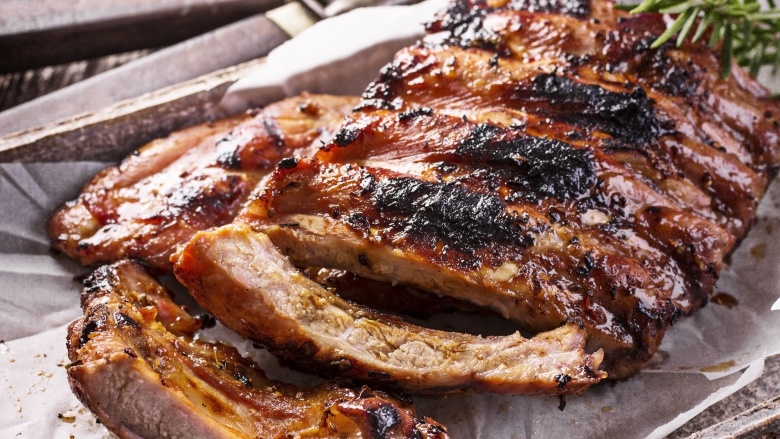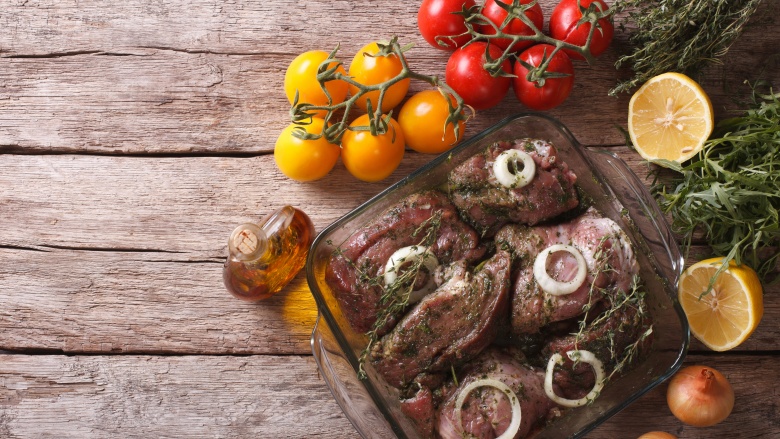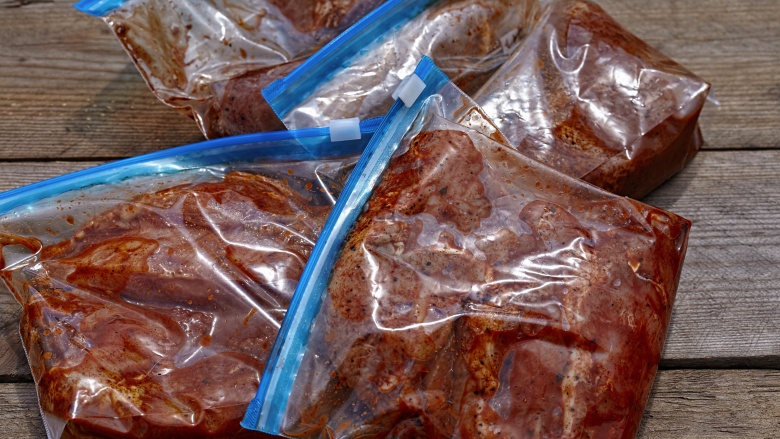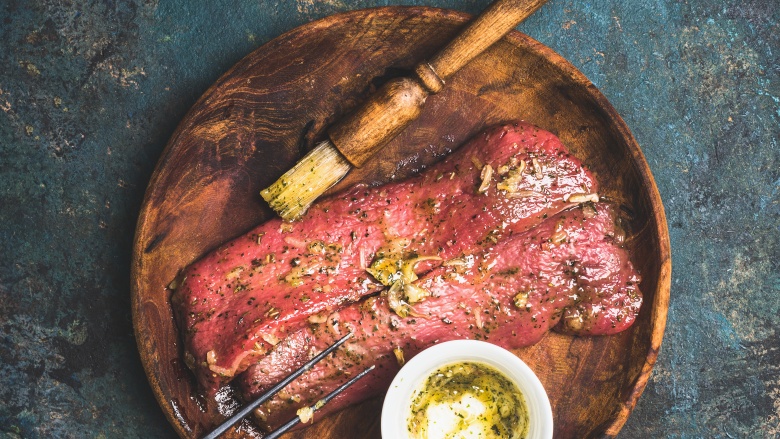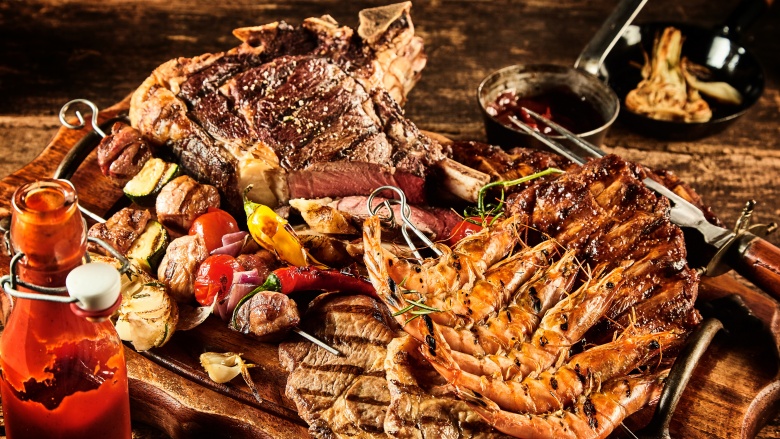How To Marinate Your Meat Perfectly
If you've ever grilled a chicken breast or steak that ended up tough as a pair of old cowboy boots, we would like to introduce you to the art of marinating meat. Marinades are the secret factor that make Korean and Southern barbecue irresistible, they make Texas brisket taste knee-slapping good, and they're what make Spanish escabeche so aromatic.
Marinades can turn any meat into something completely delicious, unless you use too much acid or marinate the meat for too long. That's when you end up with meat as unappetizing as a prop department rubber chicken. If you follow a few simple tips, we can show you how to avoid sending people running from the table.
Marinades are a busy cook's easiest flavor booster
Busy cooks love dry rubs and marinades because they can be whipped up in a flash, don't require a ton of chopping and dicing, and easily pump up the volume on a plain piece of meat. If you've ever been blown away by tender Memphis-style ribs, then you know the power of a dry rub and what it can do to pork and other meats.
The best dry rubs are made with a variety of herbs, spices, fruits (citrus zest), and vegetables (minced garlic or onion). During cooking, the rub penetrates the surface of the meat and pulls the natural juices to the surface, and as the meat slowly cooks, the juices combine with the rub to form a crisp, delicious crust even a vegetarian could drool over.
What goes into the marinade
Marinades are the king of Kitchen KISS (keep it simple, stupid) and use only three main components: acid, fat, and flavorings. No, this kind of acid isn't psychedelic, but you can find it in citrus fruits, pineapple, papaya, and tomatoes, as well as alcohol, vinegar, and acidic dairy products like yogurt and buttermilk. Chefs love acid in marinades because it adds its own flavors and it can tenderize meat by breaking down the outer layers of connective tissue.
Watch out, though, because too much time soaking in acid or too much acid in the marinade can turn red meat into a mushy, spongy mess or make chicken dry and tough. The only way to tenderize a large cut of meat, like a roast or shoulder, is with long, slow, moist heat.
Everything tastes better with fat, so most great marinades contain oil to help retain moisture during cooking. They also create that caramelized brown finish during cooking (you know, the one you secretly taste when you think no one is looking). Get creative and channel your inner mad chef! Experiment with a range of oils. Olive oil adds a green spicy flavor and luxurious body, or you can try sesame, pumpkin seed, walnut, or hazelnut for rich, nutty, earthy flavors. If you aren't in the mood for flavored oil, then consider something neutral or flavorless like grape seed, sunflower seed, or vegetable oil.
Flavorings are what make your marinade go from so-so to spectacular. Taste, texture, aroma—it's all there. You just have to explore with your taste buds and let imagination take over. Depending on the cuisine or your mood, flavorings can be fresh and dried herbs, exotic spices, vegetables (like onion and garlic), and condiments and sauces like mustard, soy sauce, sugar, molasses, honey, and ginger.
Some marinating do's and don'ts
Marinade amounts can be a lot like Goldilocks and her dilemma: too little marinade won't add enough flavor or tenderize the meat, too much marinade drowns the meat so much it can't absorb the flavors. Between 1/2 cup and 3/4 cups of marinade per pound of meat is just right.
Want to avoid sending guests to the doctor with food poisoning? Never let meat sit out on the counter to marinate. Nasty things (bacteria!) grow rapidly at room temperature [PDF] and can cause food poisoning. Why run the risk of making everyone toss their cookies? Always marinate meat in the refrigerator. It holds food at 39 degrees F or lower, where the meat won't even enter the danger zone.
Avoid the eww and yuck factors by always covering marinating meat in the refrigerator to ensure the meat won't contaminate other food. Occasionally flip the meat over to make sure all sides are exposed to the marinade.
In case we didn't scare you enough with the warnings about food poisoning, another potential hazard is the use of metal with any marinade that contains acid. Just don't do it. You don't want to use metal containers because the acid can react with metal [PDF] and cause some metals (like aluminum) to leach into the food. Instead, use lead-free pottery, glass, food-safe plastic, or use a large Ziploc bag. Now, don't you feel safer?
Remember that rubber chicken we mentioned before? Well, one problem with using too much salt, acid, or alcohol during marinating is the risk of "cooking" the meat, as in ceviche. Too much salt dries the meat out and prevents it from browning during cooking.
Marinating rules
Unless you want meat you can bounce off the wall or meat that's so dry you can mop up oil spills with it, you want to marinate different meats for different lengths of time depending on the type, cut, size, and thickness of the meat.
In general, you can marinate meat overnight or up to two days if using dry rubs and marinades that don't contain acids, salt, or alcohol. Marinades that contain salt, alcohol, and acid should marinate from 30 minutes to no more than four hours, and thin cuts should be watched carefully. The thinner the cut, the faster it toughens.
Marinades that contain citrus juice should marinate from 30 to 90 minutes and no more. (Remember the ceviche!)
Eliminate the guesswork: here's a marinating timetable
Here's a quick cheat sheet on marinating times for different meats, it isn't perfect or exact, but if you're using acid, alcohol, and salt, at least you won't embarrass yourself:
Do not marinate chicken, turkey, or duck longer than 90 minutes because acid, especially citrus juices, bleaches the flesh, turns the flesh chewy, and dries out the meat. Tender cuts of beef like steak, tenderloin, and filet mignon marinated longer than two hours will become spongy. Tougher cuts, like flank steak, chuck, and shoulder can marinate four hours or overnight. Tender cuts of lamb, like chops, should not be marinated longer than two hours. Tougher cuts like the leg and shank can be marinated four hours or overnight. Because pork contains very little fat, it can marinate for two hours for tender cuts like chops and tenderloin. Pork generally should not marinate longer than eight hours.

